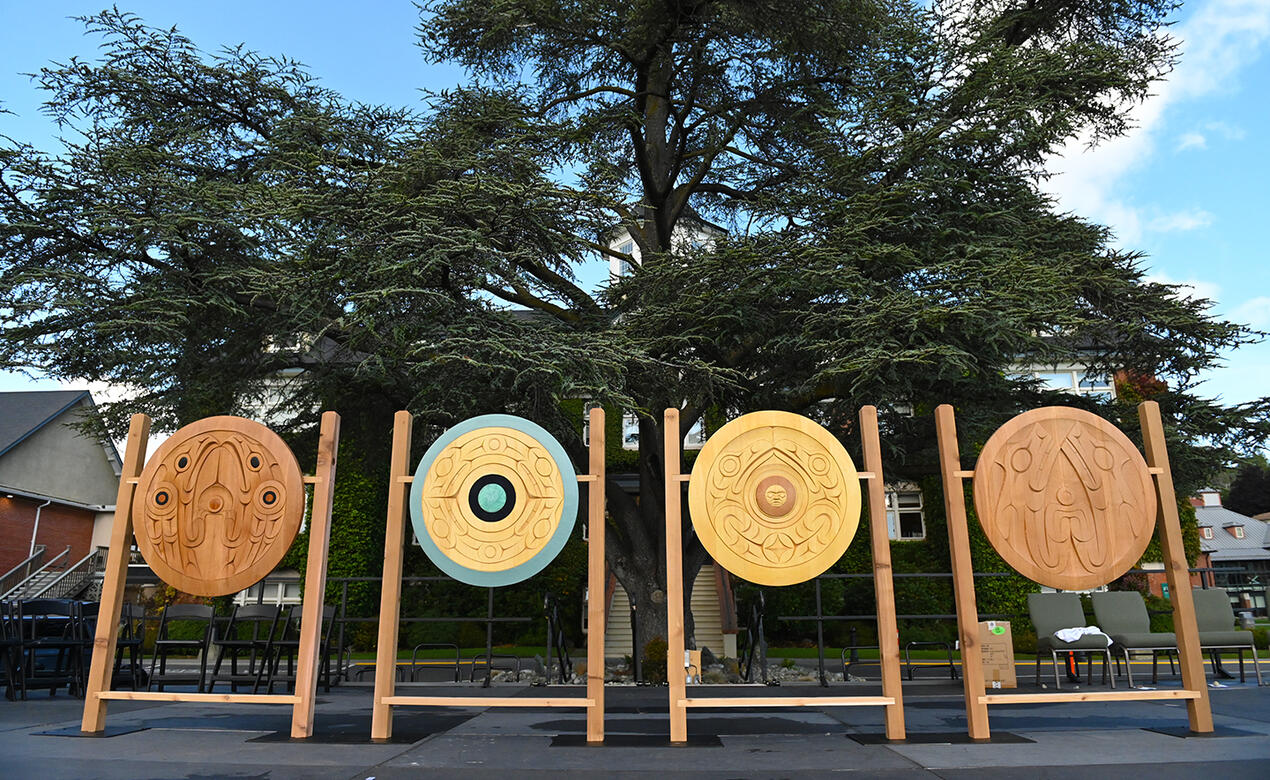
On Friday, September 29, our school community marked the third annual National Day for Truth and Reconciliation with ceremonies and learning across all three campuses. This important occasion, which emerged as a recommendation from Canada’s national Truth and Reconciliation Commission in 2015, was intended to educate us all about the lasting, traumatic, and intergenerational impacts of Canada’s residential school system.
One of our four core values at SMUS is ‘honesty,’ and we recognize that the truth of what happened to survivors and victims of residential schools is crucial when it comes to informing Canadians, and individuals worldwide, about the ongoing work of reconciliation. Each year, we mark the National Day for Truth and Reconciliation as one expression of our larger commitment to being good neighbours in our relationships with our local Indigenous communities.
Reflective and Respectful Commemoration
This year, our school’s commemorations unfolded in different, age-appropriate ways across our community. SMUS’ Indigenous Guide, Coast Salish Elder Bill White, from the Snuneymuxw First Nation, gifted our community with his deep knowledge and counsel.
At the Junior School, students engaged in an excerpt of Peggy Janicki’s story, The Secret Pocket, which highlights the resilience of young Indigenous children in the face of traumatic circumstances. Our juniors then gathered for a ceremony, led, in part, by students from the Middle School, each of whom took turns reading the story aloud. Although Bill White was unable to attend, his presence was undoubtedly felt as the students read both opening- and closing prayers Bill had developed.
Each prayer was accompanied by a song from drummer Wes Edwards, who hails from the Malahat Nation and Cowichan Tribe, while Elder Kim Recalma-Clutesi, from the Qualicum First Nation, offered brief opening- and closing remarks. A similar ceremony took place in the Chapel for Middle School, followed by reflective discussions led by homeroom advisors who worked from a grade-specific curriculum compiled by a team of our educators.
At the Senior School, students convened in their homerooms for initial learning about the scope and impacts of the residential school system, before moving to the Single Gym for their own ceremony. This gathering was intended to be more extensive, with a presentation by Qualicum First Nation member Kim Recalma-Clutesi (Ogwi’low’gwa). The former Qualicum Chief and award-winning political activist offered her reflections on how we, as a community, can move forward in a purposeful way. At the ceremony’s closing, students then returned to their homerooms for a reflective debrief.
This combined learning, witnessing, and reflecting, among students and faculty from across all three campuses, was intended to engage our school community while creating the most meaningful learning possible. In preparation for these significant and symbolic ceremonies, our faculty received training on how to facilitate challenging topics in a trauma-informed way. This included guidance from Bill on eight key cultural understandings.
“These shared pieces helped to shape both the structure and content of SMUS’ planned ceremonies and accompanying learning activities around our country’s National Day for Truth and Reconciliation,” said David Lynch, social studies teacher, and our school’s recently appointed Indigenous Liaison.
The purpose of this important day is not to ‘fix’ this wrong, or to feel guilty, but, rather, to bear witness to the truth of its continuing reality, connect with local Indigenous peoples, and celebrate the values and resiliency of their communities.
Drawing from the written guidance Bill shared, David explained how it is important, in both hosting and attending such ceremonies, that we honour our local Indigenous peoples by mirroring their tradition of opening and closing such gatherings, according to Bill, "in a way that celebrates the values they hold dear.”
Bill had noted that when Indigenous communities are referring to negative experiences, they “do so only briefly”—and even then, David paraphrased, it is simply as a way to frame the place of teachings to protect and surround their people—in this case, SMUS students and faculty learners.
Further, as Bill had explained, “these Indigenous communities would have us be especially careful when exposing children to negative events and experiences.”
David pointed out that, similar to previous years, our school’s preparations for National Day for Truth and Reconciliation have been informed by the tragic reality that, in Bill’s words, “the Indian Residential School period seriously damaged whole communities and generations of families.”
With that in mind, said David, we, at SMUS, have adopted the advice Bill has gifted us through his instructions and teachings—that “the purpose of this important day is not to ‘fix’ this wrong, or to feel guilty, but, rather, to bear witness to the truth of its continuing reality, connect with local Indigenous peoples, and celebrate the values and resiliency of their communities.”
Essentially, National Day for Truth and Reconciliation is meant to be a starting point for further discussion and, ultimately, to guide significant, meaningful action by Canadian citizens. To that end, David encourages parents and guardians to ask their children about the day’s events.
“Ask them what they learned, and how they are feeling,” he suggests. “Further discussion will help them to process their thoughts and feelings—and, you might just learn something new from your child in the process.”
If you would like to learn more about our school’s approach to National Day for Truth and Reconciliation, please do not hesitate to reach out to David Lynch.
And, if you are in or around Victoria and are looking for additional opportunities to engage and learn, consider attending an event like the South Island Powwow, hosted by the Songhees Nation, on Saturday, September 30.
Finally, if you or someone close to you has been affected by the residential school system—or the commemoration of its lasting legacy—please know that support is available. SMUS students can access counselling on campus during the school day, or, they can contact the National Indian Residential School Crisis Line (for residential school survivors, or for anyone affected by intergenerational trauma) at: 1-866-925-4419. Counsellors are available 24 hours a day.



